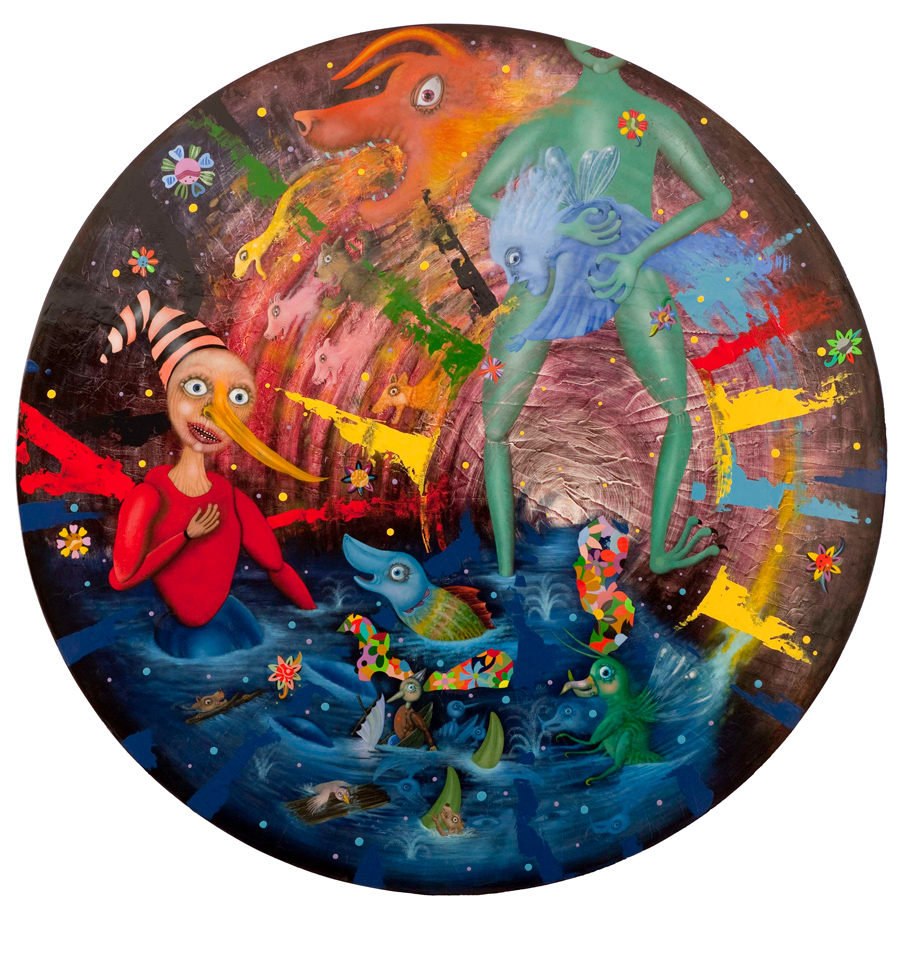
Courtesy Litvak Contemporary
If you open the Wikipedia page for the conspiracy group QAnon to the section “Origin, themes and methods”, you’ll read: “Often, messages from Q [the movement’s leader] are cryptic and vague. […] They are written in the form of enigmatic questions, through which Q provokes the Anons [followers] to do their own research. The brevity and the ambiguity of the messages has a playful dimension, the Anons being invited to solve the puzzles […] by using the usual processes of allegorical interpretation: connecting a letter (Q) to a number (17), using one word to refer to another, etc.”
Remind you of anything? Seriously. People gathering together to discuss how to interpret a mysterious text? Making a complicated exegesis out of it, playing with words and associating them to numbers? It sounds an awful lot like a beit midrash [a traditional house of study], doesn’t it? A kind of vast online yeshiva with Kabbalistic leanings, open to all the Gematria obsessives of the world’s five continents… in short, the biggest havruta in the world!
Perhaps this will not surprise you. After all, conspiracy theories and religion share, to a certain extent, the same goals: to create meaning through stories, and to weave a sense of community among those who adhere to them. Both are also based in the belief of their followers in a number of elements that are, by definition, impossible to prove. So could Judaism, unwittingly, be a conspiracy theory itself? Worse yet (or have I now caught the conspiracy virus myself?), could Jews be plotting to turn the rest of the world into conspiracy theorists, by introducing the poor confused people to techniques of esoteric interpretation that will leave them liable to believe anything and everything?
Don’t worry, that’s not what’s happening. No, QAnon didn’t spring from the twisted imagination of a Talmudist getting his kicks. And what a shame, I’m tempted to say, it really would have been a laugh! But as juicy as that story would be it remains highly implausible, for despite the similarities mentioned above, there are many fundamental differences between Jewish thought and conspiracist thought.
To start with, Judaism isn’t adversarial. It doesn’t target anyone. There are no scapegoats in the Torah nor the Talmud—except for the original scapegoat, of course, who gave its name to the expression, and except perhaps for Amalek, the sworn enemy of Israel of whom the Torah commanded the Hebrews to blot out even the memory. (Deuteronomy 25:19).
But even the enmity of Amalek and the Israelites differs from that of conspiracy theorists and the groups and individuals they attack. For one thing, this opposition is not essential to the Jewish identity, which above all rests on the commitment to a single God and to his Law. For another thing, many commentators have interpreted Amalek as being an internal enemy: Amalek, they say, is the name of our own wickedness. This capacity to see one’s primary enemy within oneself is profoundly foreign to the conspiracy theorist’s way of thinking, which obstinately looks outward for the source of all ills. Judaism and conspiracism both seek to explain the world, but they do it in a radically different way: conspiracism attributes all the troubles of the world to an outside element, while Judaism makes each human being face up to their responsibilities and their flaws.
The second fundamental distinction is that contrary to conspiracism, Judaism doesn’t proselytize. It does not try to convince crowds of ever greater size that it possesses The Truth of all truths. It can tolerate other visions of the world and other ways of living. In fact, and this is a crucial point, divergent opinions coexist even within Judaism. Even within a single movement, rabbis do not all agree on how to interpret the texts, and this is typically considered perfectly fine! In fact, it’s even an integral part of Jewish tradition. After all, the Talmud itself, Judaism’s foundational text, is constructed as a series of debates between the Sages, which do not often result in consensus but rather in the finding that two different opinions can exist side by side and both be legitimate. You’ll find nothing of this kind in the conspiracy theorist’s way of thinking, who can abide neither doubt nor contradiction.
Finally, there is a major methodological difference separating Jewish thought from conspiracist ideology. Above, I mentioned the elements the two have in common: a taste for word games and the frequent practice of associating letters with numbers and conferring meaning on them. But here’s the thing: Jewish thinkers have always followed distint rules. Unlike the wild exegesis that QAnon-style conspiracy theorists devote themselves to, the rabbinical world is rigorous and demanding. Jewish exegetes are usually accompanied by one or more masters who guide them in their exploration of the texts, drawing on layers and layers of commentary accumulated over the millennia. This framework, this mediation, helps to protect against the interpretive mania that can engulf conspiracy theorists, just as, conversely, it protects against the interpretative phobia of fundamentalists. In the face of a flood of -ists of all kinds, it may ultimately be our best defence.
Translated by Emma Roy
